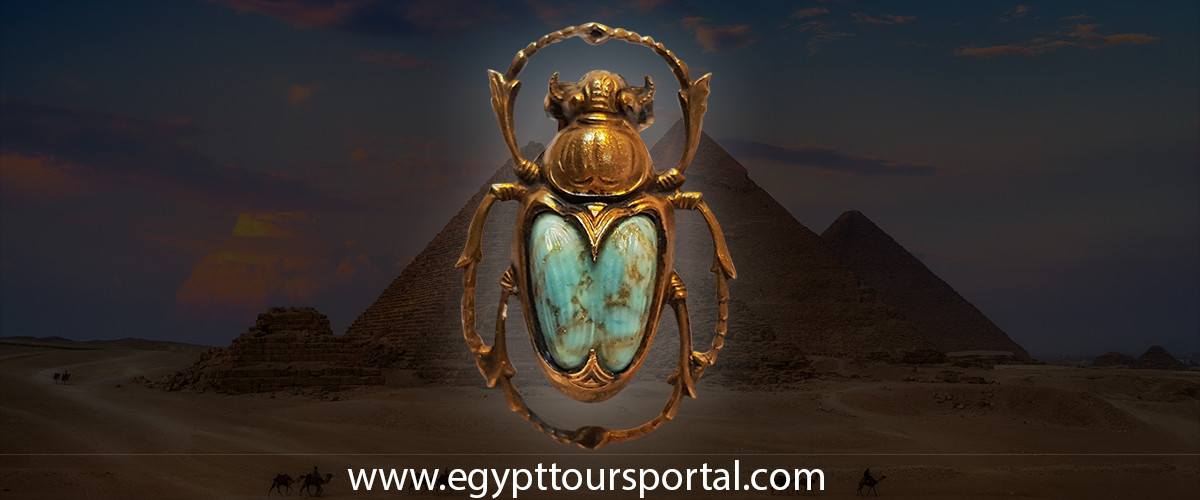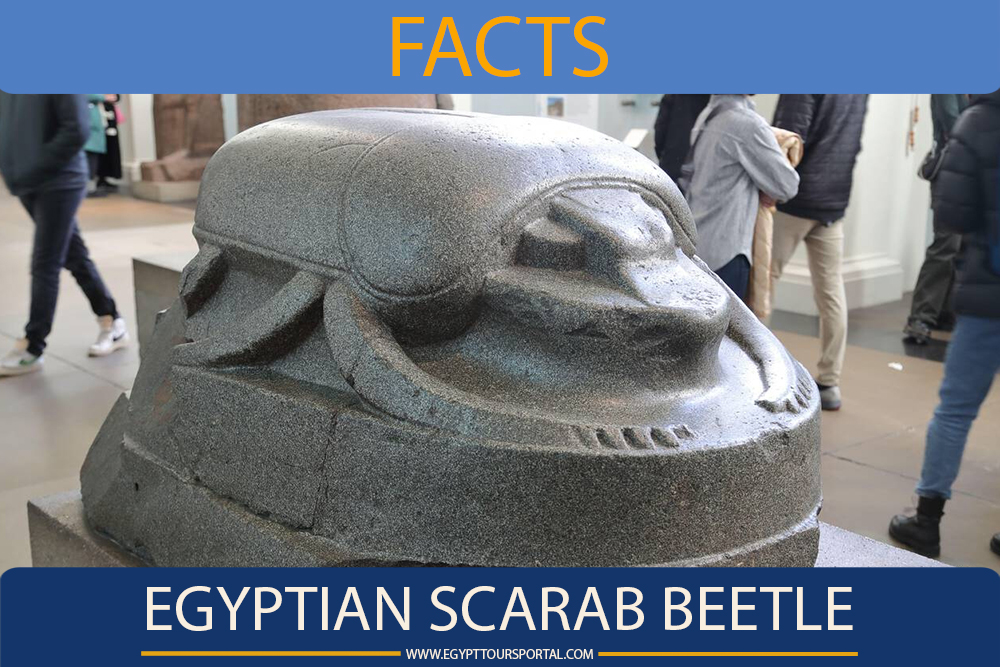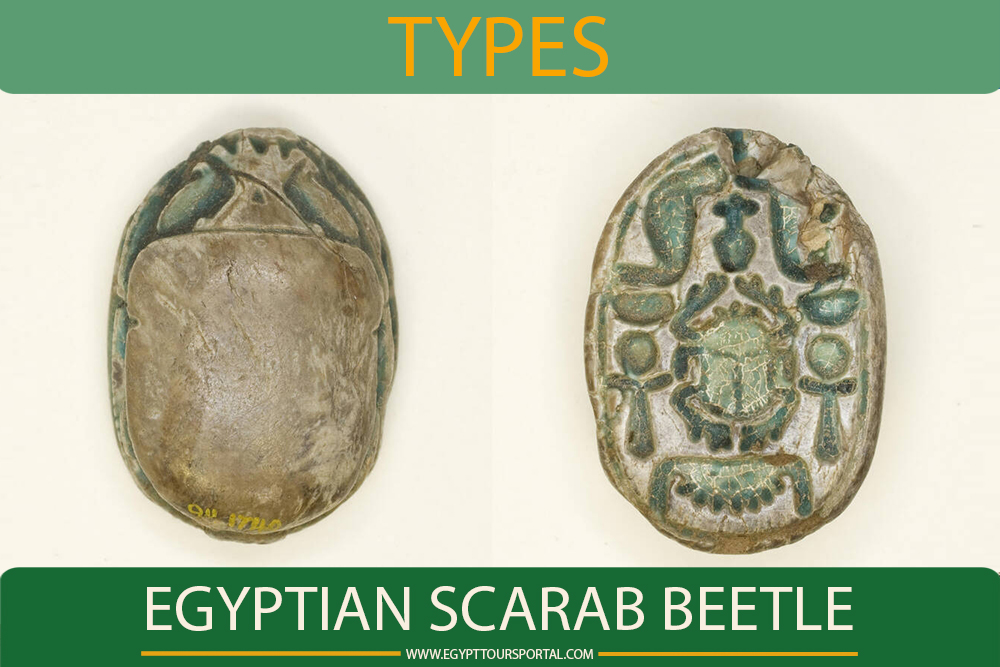Explore the profound symbolism and rich history of the Egyptian Scarab Beetle, from its ancient origins to its evolution as a symbol of life, protection, and divine manifestation. Discover its various types, materials, and roles in ancient Egyptian society.

One of the most important ancient Egyptian symbols in the history of ancient Egyptian civilization is the Egyptian Scarab Beetle, which was featured in ancient Egyptian art, iconography, and ancient Egyptian religion. It represented life, regeneration, and resurrection. Everything began when the beetle rolled its dung into a ball and laid its eggs in it; the dung acted as food for the young when they hatched, which acts as perfect imagery of life rising from death.
The symbol became directly associated with the divine manifestation of the sun god Khepri, the assistant of Ra, who rolls the morning sun disk over the eastern horizon at daybreak. The scarab hieroglyph refers to the ideas of existence, manifestation, development, effectiveness, growth, and divine manifestation.

The Egyptian Scarab Beetle was carved from stone or molded from Egyptian faience; they would first be carved from glazed blue or green and then fired up. A soft stone called Steatite that hardens when fired is called Steatite. The most common scarabs were the hardstone made from amethyst, green jasper, and carnelian. The beetle symbol came in the shape of an amulet that existed throughout all the periods of ancient Egypt when it first appeared in the late Egyptian old kingdom (2575-2130 BC), and they evolved from what was known as button seals.
They were extremely rare, but by the time of Egypt's middle kingdom (1938 1630 BC), they were created in great numbers where they were used as ornaments and an amulet, especially in Egypt's new kingdom (1539-1075 BC) as large Scarab was placed in the bandages of Egyptian mummies to represent the heart of the deceased. The symbol appeared many times in the holy book of the Dead.
The Scarab was shaped like a seal, and there were many clay sealings. The Egyptian Scarab Beetle was used to describe the titles of officials, places, and even different deities. When combined with a prayer like "With Ra Behind There Is Nothing To Fear" it was considered a sign of a good omen. In the 11th dynasty, the most valuable class of scarabs were the ones bearing royal names.
Most of the names of the Hyksos dynasts have been known due to the recovered collections of Scarabs. The scarab was imported by ancient traders from the Mediterranean, Mesopotamia, Levant, and the Middle East; even today, the scarab is still considered a typical product of present-day forgers.

The scarab is known to have deep meaning and rich symbolism that was essential to the society of the ancient Egyptians. It was worshipped by a sun god named Khepri, who was referred to as Ra, the creator of the cosmos. It was the true embodiment of the divine manifestation of the morning sun. Its behavior of emerging from dung balls represents the cycle of life and death. The scarab beetle was depicted as pushing the sun across the sky with a deep connection to Ra, which symbolizes renewal each day. The scarab was found in everything from amulets to hieroglyphs, sculptures, jewelry, amulets, and various works of art. It was a symbol of a protective force that prevented everyone from death & sickness, plus granted everyone the grace of rebirth, growth, manifestation, eternity, and resurrection.
Explore the top 100 ancient Egyptian gods and goddesses, Egyptian deities. Learn more about the names & powers of Egyptian gods & goddesses.
Read MoreScarabs served as protective amulets and talismans, which were crafted from various materials and inscribed with blessings or magical spells that were believed to bring good luck, ward off evil, and ensure a safe journey into the afterlife, plus offer a gateway to a new form of existence. It was even placed among mummy wrappings or worn as jewelry, which provided protection and guidance for the deceased. Scarabs were used as seals, with designs or inscriptions carved on their flat bottoms to create impressions in clay or other materials. These seal impressions were used for administrative, religious, or personal purposes, serving as marks of authenticity or ownership. Scarabs were also employed to commemorate events or convey political and personal statements. Pharaohs and important figures commissioned scarabs with inscriptions celebrating victories, building projects, or other significant achievements.

The types of scarabs found in Egypt vary as each type was used for a different purpose across the ancient Egyptian social fabric. These types include:
The Heart Scarabs are placed on the chest during mummification, which replaces the heart and contains spells from the Book of the Dead to aid the deceased in the afterlife. The Funerary Scarabs are associated with burial rituals that were placed among mummy wrappings or worn as jewelry, featuring inscriptions about protection and resurrection. The Amuletic Scarabs were worn for protection and featured symbols or inscriptions of protective spells. They were carried as charms by individuals seeking the beetle's symbolic protection. The Royal Commemorative Scarabs were commissioned by the Pharaohs to commemorate victories or achievements; these scarabs glorified the ruler and symbolized power and success.
The Administrative Scarabs are used as seals for documents that bear the owner's name and authenticated administrative or legal paperwork when pressed into clay or other materials. Name Scarabs are personal identifiers featuring the names and titles of individuals, used by officials and elites to mark possessions or as a form of personal branding. The Transformational Scarabs depicted a beetle pushing a solar disk, symbolizing the sun's journey and transformation; these scarabs were associated with the solar aspects of the scarab beetle and linked to the sun god Ra. The Sacred Scarabs are crafted as religious offerings that were placed in temples or tombs as votive offerings to deities, symbolizing the religious significance of the beetle.
Unveil ancient Egyptian symbols! Explore Egypt's majestic pyramids, sail the legendary Nile cruise, and witness Luxor's temples. Our immersive Egypt tour packages offer exclusive experiences and cultural delights. Budget-friendly or luxury, find your perfect Egyptian adventure and embark on an unforgettable journey.
Private 4 Days Cairo Tour Packages for New Zealander Travelers 4 days Cairo Egypt To...
Tour Location: Cairo – Giza...
5 Days Cairo and Alexandria Tour Package For New Zealander Travelers 5 days Cairo an...
Tour Location: Cairo/Giza/Alexandria...
6 Days Cairo, Luxor & Aswan Tour Package For New Zealander Travelers 6 days Cair...
Tour Location: Cairo/Giza/Aswan/Luxor...
Amazing 7 Days Cairo and Hurghada Holiday for New Zealander Travelers 7 Days Cairo &...
Tour Location: Cairo – Giza – Hurgh...
Egyptian Scarab Beetles are one of the most common artifacts in the history of ancient Egyptian. They belong to the family Scarabaeidae which is made of thousands of species worldwide. The most popular type found in Egypt is scientifically known as Scarabaeus sacer which acted as the primary inspiration behind the scarab symbol in ancient Egypt.
Scarab beetles thrive in warm climates with access to dung which was their main food source. Egypt's warm desert environment and the presence of grazing animals has the power to create suitable conditions for these beetles to flourish.
The dung beetle of Scarabaeus sacer is the most commonly associated with the Egyptian scarab symbol but there are other scarab beetle species, including Onthophagus and Copris.
There are many reasons that makes the scarab highly special such as its behavior which is seen when it rolls the dung balls which is then used for food and other purposes which the ancient Egyptian used as a symbol for the sun's movement across the sky, resonated deeply with the ancient Egyptians. The beetle's transformation from dung to a new generation resonated with the idea of personal and societal transformation. the scarab beetle was highly associated with the sun god Khepri, who was believed to roll the sun across the sky. the scarab also symbolized the sun's daily rebirth and the hope for an afterlife plus was seen as a power for protection, safety and good luck in life and of course the afterlife.
The scarab is highly scared as they were used in every shape and form in the Egyptian society as seen in all the amulets and jewelry which was seen to symbolize rebirth and transformation. It was used in funerary practices and tombs to ensure the deceased's safe passage into the afterlife. It was carved in all the artwork and statues as symbols for the sun god and all the ideas that comes with it.
There are many scarabs that live in Egypt which are known to represent a very important part of the desert ecosystem which is known to play a vital role when it comes to waste decomposition and soil aeration.
The entire country of Egypt deserve to be explored with its every heavenly detail but there are places that must be seen before any other such as the breathtaking Hurghada's red sea, The wonders of Cairo the pyramids of Giza, the great sphinx, the Egyptian Museum, Khan El Khalili Bazaar, the wonders of Luxor like Valley of the Kings, Karnak & Hatshepsut temple and the wonders of Aswan such as Abu Simbel temples, Philea temple, Unfinished obelisk and The Wonders of Alexandria like Qaitbat Citadel, Pompey's Pillar and Alexandria Library. Read more about the best places to visit in Egypt.
If you want to apply for a Visa On Arrival that lasts for 30 days then you should be one of the eligible countries, have a valid passport with at least 6 months remaining and pay 25$ USD in cash, as for the E-Visa for 30 day you should have a valid passport for at least 8 months, complete the online application, pay the e-visa fee then print the e-visa to later be presented to the airport border guard. You could also be one of the lucky ones who can obtain a free visa for 90 days. Read more about Egypt travel visa.
Egypt has a variety of delicious cuisines but we recommend “Ful & Ta’meya (Fava Beans and Falafel)”, Mulukhiya, “Koshary”, a traditional Egyptian pasta dish, and Kebab & Kofta, the Egyptian traditional meat dish.
The best time to travel to Egypt is during the winter from September to April as the climate becomes a little tropical accompanied by a magical atmosphere of warm weather with a winter breeze. You will be notified in the week of your trip if the Climate is unsafe and if any changes have been made.
You should pack everything you could ever need in a small bag so you could move easily between your destinations.
We have been creating the finest vacations for more than 20 years around the most majestic destinations in Egypt. Our staff consists of the best operators, guides and drivers who dedicate all of their time & effort to make you have the perfect vacation. All of our tours are customized by Travel, Financial & Time consultants to fit your every possible need during your vacation. It doesn't go without saying that your safety and comfort are our main priority and all of our resources will be directed to provide the finest atmosphere until you return home.
You will feel safe in Egypt as the current atmosphere of the country is quite peaceful after the government took powerful measures like restructuring the entire tourist police to include all the important and tourist attractions in Egypt. Read more about is it safe to travel to Egypt.
Wear whatever feels right and comfortable. It is advised to wear something light and comfortable footwear like a closed-toe shoe to sustain the terrain of Egypt. Put on sun block during your time in Egypt in the summer to protect yourself from the sun.
The best activity is by far boarding a Nile Cruise between Luxor and Aswan or Vise Versa. Witness the beauty of Egypt from a hot balloon or a plane and try all the delicious Egyptian cuisines and drinks plus shopping in old Cairo. Explore the allure and wonders of the red sea in the magical city resorts of Egypt like Hurghada and many more by diving and snorkeling in the marine life or Hurghada. Behold the mesmerizing western desert by a safari trip under the heavenly Egyptian skies.
There are a lot of public holidays in Egypt too many to count either religious or nation, the most important festivals are the holy month of Ramadan which ends with Eid Al Fitr, Christmas and new years eve. Read more about festivals & publich holidays in Egypt.
Egypt is considered to be one of the most liberal Islamic countries but it has become a little bit conservative in the last couple of decades so it is advised to avoid showing your chest, shoulders or legs below the knees.
Arabic is the official language and Most Egyptians, who live in the cities, speak or understand English or at least some English words or phrases. Fewer Egyptians can speak French, Italian, Spanish, and German. Professional tour guides, who work in the tourism sector, are equipped to handle visitors who cannot speak Arabic and they will speak enough English and other languages to fulfill the needs of all our clients.
The fastest way is a car, of course, a taxi. If you are in Cairo ride a white taxi to move faster or you could board the fastest way of transportation in Egypt metro if the roads are in rush hour.
The temperature in Egypt ranges from 37c to 14 c. Summer in Egypt is somehow hot but sometimes it becomes cold at night and winter is cool and mild. The average of low temperatures vary from 9.5 °C in the wintertime to 23 °C in the summertime and the average high temperatures vary from 17 °C in the wintertime to 32 °C in the summertime. The temperature is moderate all along the coasts.
It is the home of everything a traveler might be looking for from amazing historical sites dating to more than 4000 years to enchanting city resorts & beaches. You will live the vacation you deserve as Egypt has everything you could possibly imagine.









